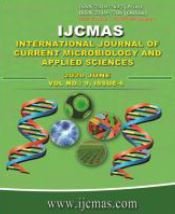


 National Academy of Agricultural Sciences (NAAS)
National Academy of Agricultural Sciences (NAAS)

|
PRINT ISSN : 2319-7692
Online ISSN : 2319-7706 Issues : 12 per year Publisher : Excellent Publishers Email : editorijcmas@gmail.com / submit@ijcmas.com Editor-in-chief: Dr.M.Prakash Index Copernicus ICV 2018: 95.39 NAAS RATING 2020: 5.38 |
Flood has been considered as one of the most recurring and frequent disasters in the world. Due to recurrent prevalence, the economic loss and life damage caused by the flood has put more burden on economy than any other natural disaster. India has continuously suffered by many flood events which claimed huge loss of life and economy. It has been found that the incidences of the flood are increasing very rapidly. Causes can be climate change, cloud bursting, tsunami, poor river management, silting etc. but devastation is increasing both in terms of lives and economies. In last decade, flood damaged more lives and economy than any other disasters. The damage caused by flood lasts several years from its advent. In the absence of an effective method to measure post impact of the flood, the assessment of loss and damaged is often not actual and far less than the actual cost. Disaster management in India has been well organised with many policies and programmes but administration and implementation of these programs demand more efficiency. The compensations and aids provided by the government and non-government organisations do not meet the cost of damages which brings higher economic burden to the people affected by these floods. It is well known that many developing countries, including India, are not always well prepared to deal with disasters. A lack of well-developed disaster management plans results in a severe loss of human life, animal life and property, which could be saved if the necessary mechanisms were in place. A lot need to be done to improve the situation, particularly in regard to livestock. In developing countries like India mitigation programmes should focus on strengthening global animal health services.
 |
 |
 |
 |
 |